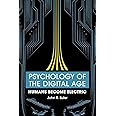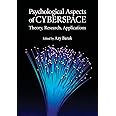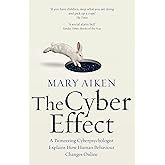
Download the free Kindle app and start reading Kindle books instantly on your smartphone, tablet or computer—no Kindle device required.
Read instantly on your browser with Kindle for Web.
Using your mobile phone camera, scan the code below and download the Kindle app.

Follow the authors
OK
Cyberpsychology: The Study of Individuals, Society and Digital Technologies Paperback – 23 December 2016
You can select and apply an appropriate plan based on your cart value at checkout.
-
3-12 mo instalmentsLatitude
-
Pay at Your PaceZip
| Payment options | Interest | Total* |
|---|---|---|
| $22.54/mo (3 mo) minimum purchase of $50 | 0% | $67.61 |
** Latitude: Monthly credit card fee (currently $10.95) will apply. Equal monthly repayments apply, account fees, late fees apply. Provider may charge interest. Exclusions apply. For more details click on Learn more above. You acknowledge that credit is provided to you by Latitude Finance Australia ABN 42 008 583 588, Australian Credit Licence number 392145, and the instalment plan is subject to the terms and conditions imposed on you by Latitude. Equal monthly repayments apply (exact amounts specified in your Latitude statement) and card fees will be charged by Latitude. If you fail to make your minimum monthly payment for two consecutive months, you agree that your equal monthly payment plans (Instalment Interest Free Promotion) with a term of fewer than 33 months will change into a minimum monthly payment plan (Interest Free Promotion) for the remaining duration of the initial plan term. If you fail to make a payment on time, Latitude will charge late fees. Latitude will also charge interest on any outstanding balance at the end of the instalment plan period you select at the rate set out in its T&Cs (currently 29.99% p.a.). Interest may also apply to other Latitude credit card transactions or if you do not comply with the Latitude T&Cs.
| Account type | Interest |
|---|---|
| Zip Pay | Always interest free^ |
| Zip Money | 12 mo interest free,
25.9% p.a. thereafter* |
^Zip Pay: This is a credit product and is interest free. Minimum monthly repayments are required. A monthly account fee of $9.95 is charged by Zip and is subject to change. Pay your closing balance in full by the due date each month and Zip will waive the fee. Available to approved applicants only and subject to completion of satisfactory credit assessment by Zip. Other charges may be payable. Fees and charges subject to change. Zip T&Cs apply. T&Cs available on application. See your Zip contract for further details. Credit provided by Zip Money Payments Pty Ltd (ABN 58 164 440 993), Australian Credit Licence Number 441878.
*Zip Money: Interest free term subject to minimum spend and promotional partner offer. Available to approved applicants only and subject to completion of satisfactory credit check. The repayment advertised will repay the transaction balance within the advertised interest free period. A monthly account fee of $9.95 applies and a one off establishment fee may apply for new customers. Under the contract, minimum monthly repayments are required and will vary depending on your credit limit. Instalment plans split eligible purchases of $300 and above into equal repayments within the interest free period. If you turn off instalments, transactions will be reverted to the minimum monthly repayment. Paying only the minimum monthly repayment may not necessarily repay a purchase within the interest free period. Any balance outstanding at the expiry of the interest free period will be charged at the standard variable interest rate, 25.9% per annum, as at 1 June 2023. Other charges may be payable, see T&Cs. Interest, fees and charges are subject to change. Terms & Conditions apply and are available on application. See your contract for further details. Credit provided by ZipMoney Payments Pty Ltd (ABN 58 164 440 993), Australian Credit Licence Number (441878).
Purchase options and add-ons
An important new textbook for an exciting area of contemporary psychological study and research...
The field of cyberpsychology examines the psychology of interactions between individuals, societies and digital technologies. This engaging and accessible textbook offers a complete introduction to the subject. The authors outline key theories, provide critical assessments, identify areas in need of further research, and discuss ways to use digital technologies as a research tool. They also include a wealth of real life examples, activities and discussion questions for students at undergraduate and graduate levels.
Cyberpsychology provides up-to-date coverage of a wide range of topics relating to online behaviour, and considers the potential impact of these interactions offline:
- online identity
- online dating and relationships
- pornography
- cyberbullying
- children's use of the Internet
- online games and gambling
- deception
- online crime
- Print length272 pages
- LanguageEnglish
- PublisherBPS Blackwell
- Publication date23 December 2016
- Dimensions18.8 x 1.52 x 24.38 cm
- ISBN-100470975628
- ISBN-13978-0470975626
Frequently bought together

Customers who viewed this item also viewed
From the Publisher





Product description
From the Publisher
Monica T. Whitty is Professor of Human Factors in Cyber Security in WMG at the University of Warwick, UK. Her research focus is on cybersecurity, cybercrime and online behaviour. She is a co-author or co-editor of several books, and has published widely on cybersecurity, mass-marketing fraud, insider threat, cyberstalking, online identity, cyber-relationships, cyberethics, online surveillance and taboos in video games.
Garry Young is Senior Lecturer in Psychology at Nottingham Trent University, UK. His research and teaching focus on the ethics of enacting real-life taboos within virtual environments, the phenomenology of delusions, and embodied cognition. He has published widely on ethics in video games, notions of self in cyberspace, the Capgras and Cotard delusions, and differences between procedural and declarative knowledge.
From the Inside Flap
An important new textbook for an exciting area of contemporary psychological study and research…
The field of cyberpsychology examines the psychology of interactions between individuals, societies and digital technologies. This engaging and accessible textbook offers a complete introduction to the subject. The authors outline key theories, provide critical assessments, identify areas in need of further research, and discuss ways to use digital technologies as a research tool. They also include a wealth of real life examples, activities and discussion questions for students at undergraduate and graduate levels.
Cyberpsychology provides up-to-date coverage of a wide range of topics relating to online behaviour, and considers the potential impact of these interactions offline:
- online identity
- online dating and relationships
- pornography
- cyberbullying
- children’s use of the Internet
- online games and gambling
- deception
- online crime
From the Back Cover
An important new textbook for an exciting area of contemporary psychological study and research…
The field of cyberpsychology examines the psychology of interactions between individuals, societies and digital technologies. This engaging and accessible textbook offers a complete introduction to the subject. The authors outline key theories, provide critical assessments, identify areas in need of further research, and discuss ways to use digital technologies as a research tool. They also include a wealth of real life examples, activities and discussion questions for students at undergraduate and graduate levels.
Cyberpsychology provides up-to-date coverage of a wide range of topics relating to online behaviour, and considers the potential impact of these interactions offline:
- online identity
- online dating and relationships
- pornography
- cyberbullying
- children’s use of the Internet
- online games and gambling
- deception
- online crime
About the Author
Monica T. Whitty is Professor of Human Factors in Cyber Security in WMG at the University of Warwick, UK. Her research focus is on cybersecurity, cybercrime and online behaviour. She is a co-author or co-editor of several books, and has published widely on cybersecurity, mass-marketing fraud, insider threat, cyberstalking, online identity, cyber-relationships, cyberethics, online surveillance and taboos in video games.
Garry Young is Senior Lecturer in Psychology at Nottingham Trent University, UK. His research and teaching focus on the ethics of enacting real-life taboos within virtual environments, the phenomenology of delusions, and embodied cognition. He has published widely on ethics in video games, notions of self in cyberspace, the Capgras and Cotard delusions, and differences between procedural and declarative knowledge.
Product details
- Publisher : BPS Blackwell
- Publication date : 23 December 2016
- Edition : 1st
- Language : English
- Print length : 272 pages
- ISBN-10 : 0470975628
- ISBN-13 : 978-0470975626
- Item weight : 454 g
- Dimensions : 18.8 x 1.52 x 24.38 cm
- Part of series : BPS Textbooks in Psychology
- Customer Reviews:
About the authors

Discover more of the author’s books, see similar authors, read book recommendations and more.

Discover more of the author’s books, see similar authors, read book recommendations and more.
Customer reviews
Top reviews from Australia
Top reviews from other countries
 NoahReviewed in the United Kingdom on 26 February 2017
NoahReviewed in the United Kingdom on 26 February 20175.0 out of 5 stars An excellent primer on the subject with an autoritative reference section which will direct your research
This Wiley text book offers a look for psychology or allied subject students, at the impact that the cyber world is known to have on our lives. With a very attractive layout and ample use of subheadings, the good sized business like font on bright white paper produces something that is very clear and readable.
The 37 pages of references at the back (out of a total of 247 pages, another 8 of which form a satisfactory subject index) not only give you every connection from the text but also let you know that this textbook is really a summary of the research work that has been done in these areas. In many ways there could be more detail, except that the authors are revealing that there îs still much work to be done in the sphere. If you are studying the subject, this book must be a prerequisite for your course. There are discussions of issues such as pornography, children's use of the internet, cyberbullying, online crime, online dating, games, gambling and issues of identity and addiction. This book may not have all the detail n all of these subjects but it does refer you to all the relevant research so you can read up for yourself. This volume also serves as a sort of dictionary for the subjects and directs you to all the original sources.
This book is a credit to its authors and whereas it won't be the only reading you need to do, it my be the only book you need to buy, because it will lead you to the primary journals and papers.
 Margaret7Reviewed in the United Kingdom on 28 May 2017
Margaret7Reviewed in the United Kingdom on 28 May 20175.0 out of 5 stars Excellent introduction and overview.
This is a much-needed academic text for undergraduate and graduate psychology students, taking on the subject of the intersection between psychology and the many-tentacled internet in all its connective pain and glory. The book is approved by the BPS so is relevant to students and professionals in the UK. While it is a relatively slim volume, the authors have done their best to give a good, research-based overview of the many ways the internet impacts our lives and our emotional health. It is well referenced for futher study and is certainly a very good starting point for anyone wanting to dig into this subject and learn more.
 LarkReviewed in the United Kingdom on 17 March 2017
LarkReviewed in the United Kingdom on 17 March 20175.0 out of 5 stars Surely a pioneering read
Its great to read what is surely a pioneering read in an emerging field of psychological research findings, which I think is aimed at a more academic readership of research scholars and psychology students but which I believe will prove to be just as interesting to a popular readership, particularly anyone who has an interest in social media, online forums, the internet and life online, or perhaps an interest in those that do if they do not themselves.
The layout of the book is great, there are pages and pages of references, bibliography and supporting research citations, a vital resource for anyone considering crafting research projects in what the authors themselves acknowledge is a relatively speaking under researched field of psychology (most interested individuals, including some online forum moderators, I know have applied psychological knowledge or research from elsewhere, such as MBTI or personality matrices, or earlier research, depth psychology, behaviourism, even in one instance Goffman's conclusions about Asylums to online interaction). Chapters are accompanied by helpful discussion questions (which could be set as essay topics or give ideas about essay topics for students), suggested reading (specific sources corresponding to the topics in that chapter) and suggested activities, such as "Have you ever disguised aspects of your identity or pretended to be someone else online? If so, was this a positive or negative experience for you?".
I found the chapter on "Online Support and Health Care" to be particularly interesting, especially the chapter on E-Therapy, assessing the effectiveness of e-therapies and immersive virtual environments as aids to treatments, even should life online not expand or evolve beyond what it is at present it has formative potential and deterministic influence as it is and I personally think its a matter of time before medicine, therapy, police and social services will have to better exploit it as a resource.
One thing I would say, which I think was not mentioned in other reviews, is that while not shrinking from covering the more dubious and criminal applications or reality of internet technology (there are chapters on online sexual activities, internet infidelity, online deception, online crimes: scams, fraud and illegal downloads; online crimes: cyberharassment, Hate crimes and cyberwarfare; online crimes: Child pornography and paedophilia) it does aim for, and I think achieves, balance (there are also chapters on the "self" in cyberspace, some good material on Goffman here, online relationships, online dating, children's and teens' use of digital technologies, online education, leisure and entertainment, online gaming and gambling and the chapter I mentioned already on online support and health care).
There is the potential that I like more academic reads, style and pace of writing but I also particularly liked that there was the brief contents page and then an expanded contents complete with subheadings, so you have Chapter 2: The "Self" in Cyberspace and then the subheadings 2.1 Defining the "self"; 2.2 The self in cyberspace; 2.3 Disembodied selves in cyberspace and so forth. There surely will be more books of this kind in future and I think readers can only hope that they will be as good as this one. Recommended.
If you've read any other books on the psychology of online behaviour, such as Love Online (to mention one superior more pop psychology read), and liked them, then dont hesitate to get a copy of this today.
 El LoroReviewed in the United Kingdom on 31 January 2019
El LoroReviewed in the United Kingdom on 31 January 20194.0 out of 5 stars Not a pop psychology book
This is an impressive undergraduate level text which may appeal to ambitious laypeople and A level students. It is not a pop psychology book.
I found it fascinating and very current. This is an emerging field of tremendous significance on a global level and is worth a few evenings if you want to be well informed.
 writeallthereviewsReviewed in the United Kingdom on 24 April 2017
writeallthereviewsReviewed in the United Kingdom on 24 April 20175.0 out of 5 stars An interesting and comprehensive title. As an aspiring infrastructure ...
An interesting and comprehensive title. As an aspiring infrastructure architect looking to move into cyber security, I found this well-researched and accessibly written for professionals already in the field. An important text for anyone interested in the welfare and future of information security as a whole.









